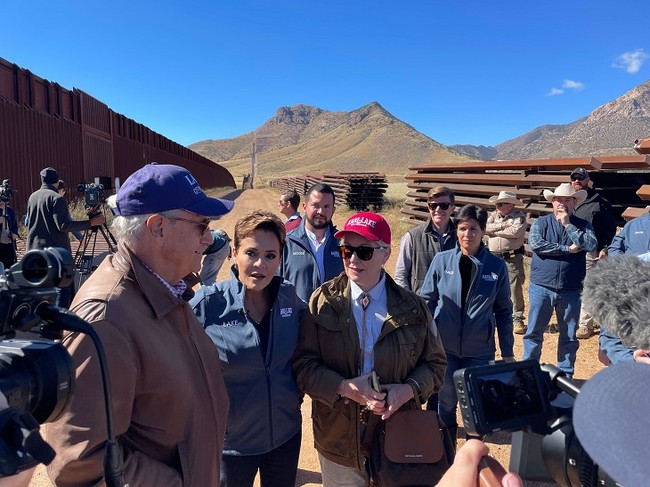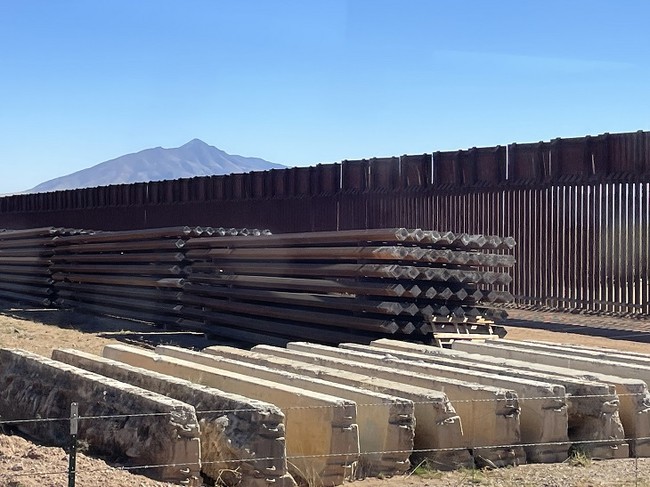The Arizona Republican slate of candidates visited the Tucson sector of the border on Friday morning, and I joined the press pool to dive deeper into the nominees’ border policies and get a better idea of the ongoing crisis.
To start the day off, gubernatorial nominee Kari Lake, senatorial nominee Blake Masters, attorney general nominee Abe Hamadeh, and secretary of state nominee Mark Finchem met with Cochise County Sheriff Mark Dannels and Pinal County Sheriff Mark Lamb for a border crisis roundtable in Sierra Vista, Arizona.
Dannels primarily led the presentation with facts about the situation, including information about the tactics they use to promote border security, especially with SABRE, which stands for the Southern Arizona Border Region Enforcement Team.
The briefing focused on smuggling and pursuits, as the presentation said that county law enforcement takes part in “an estimated two to 10 failure to yield incidents” daily. In addition, Dannels emphasized how 44 percent of jail bookings in his county are border-related.
The sheriff also discussed how teenagers are recruited through social media to help with the illegal efforts of cartels.
“Abe, I’m looking forward to working with you on this, because we have to do something with our social media,” Dannels told the attorney general candidate.
After Dannels concluded, the candidates commented on the crisis.
“And what they’re dealing with in Sheriff Dannels’ county, where we are here in Cochise County, is the gotaways. We don’t know who these people are,” Lake said.
In terms of how the fentanyl crisis ties into the border, parents Clark and Karen Griffin joined the roundtable to share the story of their son, Tyler, who died due to fentanyl poisoning after his neighbor gave him a drug that contained the potent substance.

“Most of these children and young adults have no idea they’re taking a pill that is not only laced with fentanyl, now it’s just pure fentanyl,” Karen Griffin said.
Following the roundtable, reporters and the candidates were escorted by law enforcement to the border wall in the Coronado National Forest, near Naco, Arizona.
This particular area on the border contained two key visuals: the supplies left over at the border after the Biden administration halted construction of the wall in that area, and an area up on a hill where the wall ends.

While at the border, the group held a press gaggle, in which I had the opportunity to ask Masters and Hamadeh about how they plan to handle smuggling recruitment on social media platforms.
Part 1: I asked Blake Masters and Abe Hamadeh their thoughts on social media recruitment for smuggling pic.twitter.com/5Qwz26jQ27
— Cameron Arcand (@cameron_arcand) November 4, 2022
Part 2: pic.twitter.com/Syc2Hc9xDF
— Cameron Arcand (@cameron_arcand) November 4, 2022
“This is where we’re going to get a lot more aggressive with Big Tech, hold them accountable at the state level,” Hamadeh said, calling it “unacceptable.”
Masters said that regulating Big Tech would be necessary on the federal level.
“We need to meaningfully restrain these companies, otherwise there’s going to be no First Amendment here in the next couple of years,” Masters said.
“These platforms are not doing near enough to police the cartel activity,” he later added.
As Election Day is on Tuesday, these Republican candidates will quickly go into transition mode into their new offices if they win, which will likely bring further details as to what their border plans will look like in practice.













Join the conversation as a VIP Member